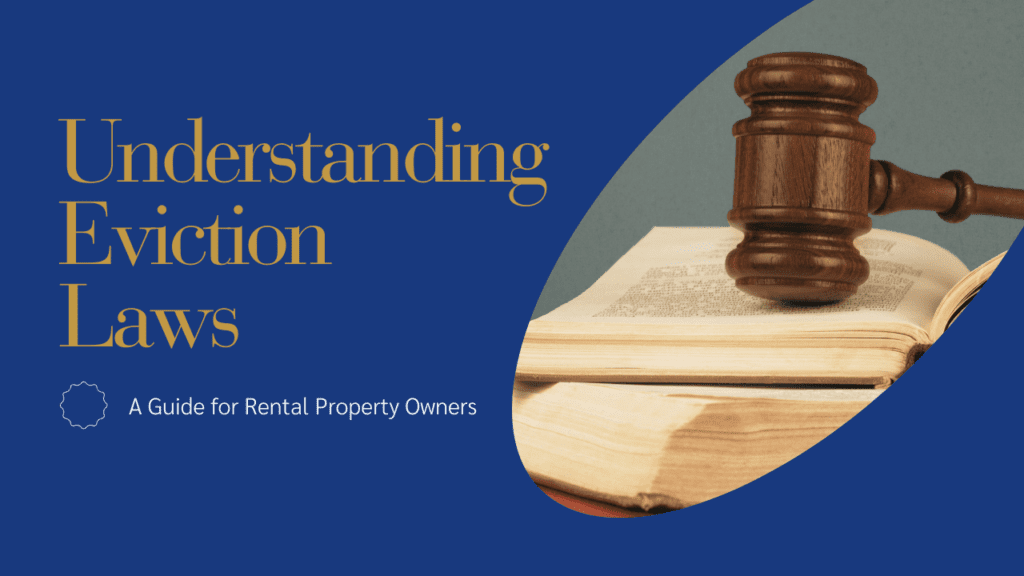
Navigating the eviction process as a landlord can be challenging. Whether you find yourself dealing with tenants who have fallen behind on rent or violated the lease terms, it’s essential to have a solid grasp of the specific rules and procedures governing evictions in Atlanta.
A good way to safeguard your investment and ensure a hassle-free eviction process is by understanding your rights and responsibilities. Here is a comprehensive guide designed specifically for rental property owners in Atlanta that provides you with the knowledge and insights to confidently navigate the intricacies of Atlanta’s eviction laws.
Atlanta Eviction Laws & Regulations
In Atlanta, a landlord can evict a tenant for various reasons, such as failing to pay rent, violating the lease, or not obeying rental agreement terms. However, before proceeding with eviction, the landlord needs to provide the tenant with an opportunity to rectify the situation.
This is done by giving the tenant a notice that asks them to comply with the lease or rental agreement. Only if the tenant fails to comply with the notice can the landlord terminate the tenancy and initiate an eviction lawsuit.
Notice for Eviction with Cause
One crucial aspect of eviction in Atlanta, GA, is the requirement for the landlord to have a valid cause or legal reason for termination. The legal reasons for eviction in Georgia include non-payment of rent and violation of the lease.
When faced with these situations, the landlord must provide the tenant with a written notice, also known as a demand, requesting rent payment or compliance with the lease terms. Unlike other states, Georgia does not specify the waiting period before filing an eviction lawsuit. The landlord can provide as little as 24 hours or ten days for the tenant to comply with the notice before initiating legal action.
Notice for Termination without Cause
In cases where a landlord wants to terminate a tenancy without cause, they must wait until the lease term ends before expecting the tenant to vacate. However, even in such cases, the landlord may still need to provide written notice to the tenant to move out. Landlords in Atlanta need to understand the specific eviction rules and procedures to ensure compliance with the law.
How Long Does It Take to Evict a Tenant in Atlanta?
The timeline for eviction can vary depending on several factors. On average, the eviction process in Atlanta can take anywhere from 14 to 80 days, starting from the initial notice period to the return of possession.
Factors that may affect the duration of the eviction process include the terms of the lease, the promptness of filing paperwork with the court, the time required to obtain a favorable court decision and a Writ of Possession, and the efficiency of court officials in responding to the Writ of Possession.
Exceptional circumstances, such as tenant disputes and appeals, can significantly prolong eviction. Landlords should be ready for the possibility of a lengthy and costly eviction process in Atlanta. Following the correct procedures and understanding the local eviction laws is crucial to expedite the process.
Steps to Evict a Tenant in Atlanta, GA
Once you have a valid reason for eviction, you can take the necessary steps to remove a tenant from your unit in Atlanta, Georgia.
Understand the Grounds for Eviction
The first step to evicting a tenant in Atlanta is to have a valid reason for the eviction. Non-payment of rent is common ground, but a serious violation of the rental agreement terms can also be grounds for eviction. This includes damaging the rental property, exceeding the agreed-upon number of pets, engaging in criminal activities, smoking in a non-smoking property, and so on.
Give the Tenant a Written Notice
In Atlanta, Georgia, landlords don’t require to provide a written eviction notice. However, it is advisable to serve the tenant with a written “Notice to Comply” to have concrete evidence of the notice.
The written notice should include the date of service, names, and addresses of all tenants, the reason for the notice, the amount of rent owed (if applicable), any additional fees due, the time given to pay rent or resolve the violation, and a description of how the notice will be delivered to the tenant.
It is essential to keep photographs and receipts of all your communication with the renter as evidence for potential legal proceedings.
File a Complaint With the Court
If the tenant fails to comply with the notice within the specified timeframe, the landlord can initiate the official eviction process by filing a complaint with the local Magistrate Court. Filing fees typically range from $60.00 to $75.00. It is advisable to fill out the paperwork correctly or seek assistance from a real estate attorney to avoid any delays.
Serve the Tenant
After filing the complaint, the court will issue a Landlord-Tenant (Dispossessory) Affidavit, which a local Sheriff will deliver to the tenant or send via certified mail if the tenant is unavailable. The tenant must then respond to the court within seven days.
Failing to respond may result in a default judgment in favor of the landlord, allowing the landlord to request an eviction on the eighth day. If the tenant does respond, the court will schedule a date for the trial, and the tenant will receive a notification via certified mail.
Attend the Trial
The trial date will depend on the court’s availability. During this time, it is crucial for the landlord to gather strong evidence and prepare a compelling argument. This evidence can include lease terms, photographs of property damage, security camera footage, and proof of non-payment. The tenant may try to deny the claims, so it is crucial to have supporting evidence such as text messages, bank statements, and voicemail messages.
Retake Possession of the Property
If the landlord wins the case, they will be issued a Writ of Possession within seven days. This writ gives the tenant at least seven days to vacate the premises voluntarily. If the tenant refuses to leave, court officials may forcefully remove them, though the timeframe for this action may vary. Any belongings left by the tenant can be disposed of immediately after officially vacating.
It is worth mentioning that some landlords in Atlanta attempt to avoid lengthy and costly evictions by offering “cash for keys” agreements, providing a monetary incentive for the tenant to move out voluntarily. If the tenant declines this offer, a formal eviction through the court becomes necessary.
Approach Professional Property Managers
 Successfully navigating the eviction process in Atlanta, GA, requires meticulous adherence to the specific rules and procedures outlined by the law. As a landlord, it is crucial to have a valid reason for eviction, provide the tenant with proper notice, follow the correct filing procedures with the court, and be ready for the possibility of attending a trial.
Successfully navigating the eviction process in Atlanta, GA, requires meticulous adherence to the specific rules and procedures outlined by the law. As a landlord, it is crucial to have a valid reason for eviction, provide the tenant with proper notice, follow the correct filing procedures with the court, and be ready for the possibility of attending a trial.
Considering the complexities and potential challenges involved, seeking guidance from a professional property management company like Silas Frazier Realty, LLC can be beneficial.
We are a reputed property management company serving Atlanta, Snellville, Stone Mountain, Lilburn, Conyers, Smyrna, Marietta, Lithonia, Jonesboro, McDonough, Vinings, Brookhaven, and Tucker.
With our expertise in Atlanta’s real estate market and comprehensive knowledge of eviction laws, we can take the burden off landlords’ shoulders by handling the eviction process on their behalf.
Reach us at Silas Frazier Realty, LLC to learn more about eviction laws and regulations in Atlanta.
